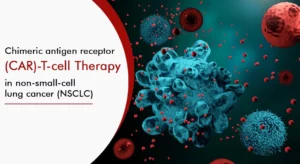Prostate cancer (PCa) is the most commonly diagnosed non-cutaneous cancer among men. PCa is usually diagnosed in men above 65 years of age. There are various treatment options for prostate cancer which are listed below
Depending on the severity of the disease, current treatment options for prostate cancer are:
- active surveillance,
- prostatectomy
- radiation therapy
- hormonal therapy
- chemotherapy
Up to one-third of patients with a localized tumor eventually fails on local therapy
and progress to advanced-stage within 10 years.
- For advanced PCa, androgen deprivation therapy is the standard of care.
For cases with metastatic castration-resistant prostate cancer (mCRPC): the median survival in phase III studies range from 15 to 19 months.
For several years, the chemotherapeutic drug docetaxel was the only treatment option for mCRPC, but now new agents targeting the androgen signaling pathway, immunotherapeutic options, radium-223 treatment, and the new chemotherapeutic treatment modality taxane cabazitaxel are emerging therapies with the ability to improve both the survival and the quality of life.
It was first in year 2010, when cellular immunotherapy was approved as a treatment for mCRPC by the US Food and Drug Administration (FDA). More recently, cancer immunotherapy hit a new peak, in year 2013.
Especially, modulation of T-cell checkpoints via Immune system modulator [anti-cytotoxic T lymphocyte antigen-4 (CTLA-4) monoclonal antibodies and anti-programed death (ligand) 1 (PD-(L)1 monoclonal antibodies that has been successful.
The increased knowledge of how specific immune responses are evoked and manipulated has enabled implementation of novel immune-based cancer therapies. The rationale of these immunotherapies is to induce anti-tumor immune responses, decrease tumor-load.
This is successful in improving overall survival that is also observed in primary endpoint of most clinical studies.
Despite the fact that PSA-based immunotherapeutic approaches can stimulate effective response, the ongoing phase III clinical trial (NCT01322490) might provide more evidence on the clinical relevance of PSA-TRICOM/PROSTVAC-VF vaccinations
Human prostate acid posphatase (PAP) -a secreted glycoprotein enzyme is also elevated in patients with bone metastasis, compared to those without bone metastasis and its elevation of PAP is associated with significantly shortened survival, while its decrease is correlated with responsiveness to therapy.
But due to its elevated expression in PCa, PAP has been investigated as a possible target antigen for immunotherapeutic approaches. PAP-specific cytolytic T-cell responses have additionally been identified in HLA-A2 transgenic mice. Overall, these data suggest that PAP-specific T-cell responses can be initiated, to use in cancer immunotherapy
In this focus on commonly expressed tumor-associated antigens and patient-specific epitopes identification to improve T-cell reactivity is significant. Targeting these patient- and cancer-specific mutated epitopes holds promise for even better results.
Also Read:




